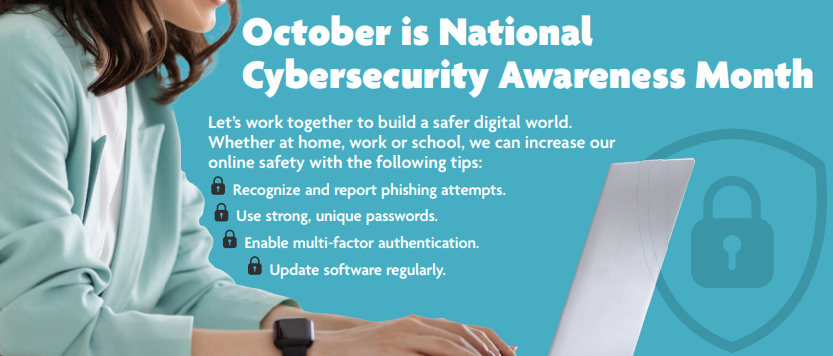As an organization responsible for delivering our member-owners the electricity they depend on to power their lives, homes, businesses, entertainment and even their vehicles, Victory Electric understands how important cybersecurity has become. Cybercrimes have grown exponentially over the last few years.
Unfortunately, criminals have learned how to exploit businesses for millions of dollars as they penetrate networks, encrypt data, and then hold the data and business systems hostage until a ransom is paid. But that is not all. Hostile foreign governments are targeting infrastructure assets to wreak havoc and devastation to the American economy.
Victory has many resources at our disposal to help us maintain a cyber-resilient network and we are constantly looking to make things more secure. But what are YOU doing to protect your data and your home network?
That is the question everyone should be asking themselves — not just during Cybersecurity Awareness Month but all year. Every household with Internet service is at risk of becoming compromised in some way. But household internet users can take several steps to make their network secure and protect themselves against becoming a cyber victim.
The most important feature of a secure network is a strong password to access it. Change passwords regularly and make them strong with complexity and length. A 12-character password with complex symbols usually would take hundreds of years to brute-force crack. Yearly password changes may be inconvenient, but imagine the inconvenience if a hacker broke into your banking or personal computer.
The next most important method of securing a network is to enable encryption. WPA3 encryption is available on every home router and should be enabled. If your home router does not have a modern encryption protocol, it may be obsolete. Over time manufacturers stop supporting and releasing updated firmware for older models. If your home router is more than seven years old, it may be time to upgrade to a newer model. Just like Victory does with our critical systems, you should check the operating system of your router routinely to check for updates. If there is a new release, be sure to apply it to your network components.

Here are the primary ways home internet users can safeguard their networks:
1. Use Strong Passwords: Ensure that your Wi-Fi network and router have strong, unique passwords. Never use the default passwords provided by the manufacturer. Hackers are familiar with the default passwords used by every manufacturer and use automated systems to search for networks still using them.
2. Enable Network Encryption: Use WPA3 encryption if available, or at least WPA2, to secure your Wi-Fi network. This helps protect the data transmitted over your network.
3. Update Firmware and Software: Regularly update your router's firmware and all connected devices' software to protect against known vulnerabilities.
4. Disable Remote Management: Make sure to turn off remote management features on your router to prevent unauthorized access from outside your home network. If you do need this feature turned on, keep it turned off when you are not actively using it.
5. Use a Guest Network: Set up a separate guest network for visitors to keep your main network more secure. Having a guest Wi-Fi network for your nephew when the extended family is over for Christmas is an effective way to keep your primary network secure.
6. Enable Firewall: Ensure that your router's firewall is enabled to block unauthorized access attempts. This will prevent many brute-force penetration attempts to crack a password.
7. Monitor Connected Devices: Regularly check the devices connected to your network and remove any that you do not recognize.
8. Use Antivirus and Anti-Malware Software: Install and maintain antivirus and anti-malware software on all devices connected to your network.
9. Educate Household Members: Make sure everyone in your household understands the importance of network security and follows best practices.
By following these steps, you can significantly reduce the risk of your network becoming compromised and you becoming a cybercrime victim.
